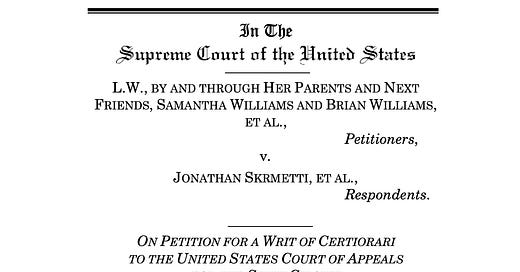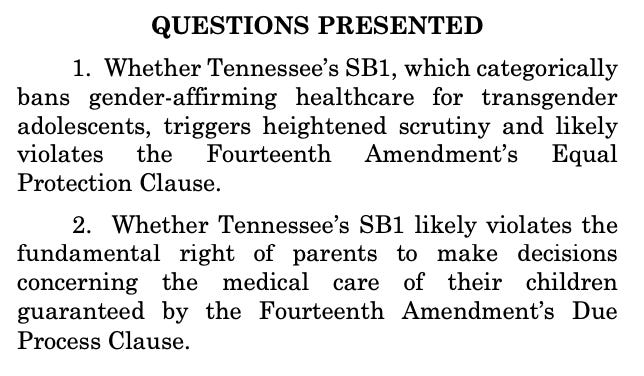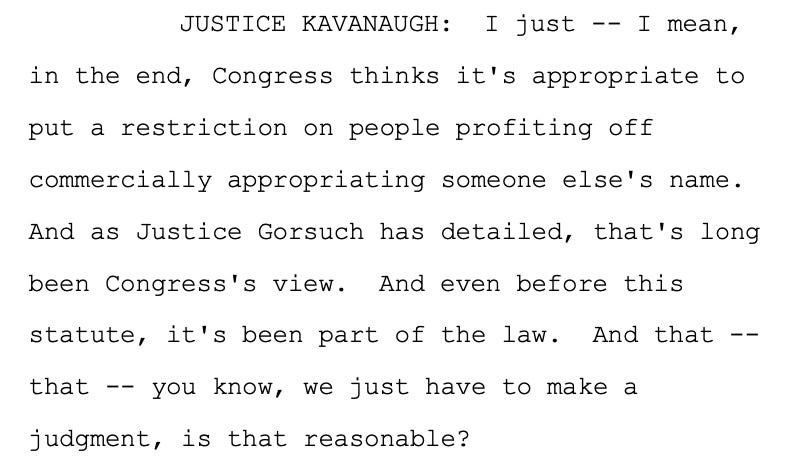
Trans care bans reach Supreme Court as Tennessee families ask court to take case
A similar Kentucky filing is also expected this week. And: The justices are poised to reject "Trump Too Small" T-shirts' trademark protection.
On Wednesday, lawyers for Tennessee transgender youth and their parents, as well as medical providers, asked the Supreme Court to hear a case over Tennessee’s ban on gender-affirming medical care for minors.
The filing — a petition for a writ of certiorari — in L.W. v. Skrmetti followed a Sept. 28 ruling from the U.S. Court of Appeals for the Sixth Circuit holding, on a 2-1 vote, that Tennessee’s ban is likely constitutional.
Lawyers for a second case decided by that ruling, Kentucky’s Doe v. Thornbury, are expected to file their own request later this week. They announced on Wednesday that they will be filing a petition.
The challengers in the Tennessee case — represented by lawyers from the ACLU, ACLU of Tennessee, Lambda Legal, and Akin Gump — raise issues against the constitutionality of S.B. 1 — which I have been covering at Law Dork all year — similar to those raised across the country in challenges to these laws.
There are generally three primary claims being raised in these cases, two relating to equal protection and one relating to due process. (Due to the language in some of the laws, some litigation also raises First Amendment speech claims.)
The equal protection claims are that the laws discriminate based on sex and on basis of transgender status. Although related, they can both form an independent rationale for a ruling against the laws — and have in different rulings.
The due process claims relate to parental rights regarding the upbringing of their children — here, more specifically, “decisions concerning the medical care of their children,” as the petition puts it.
As I wrote here last week, these are not at all the only cases:
This filing [comes] as the Eleventh Circuit is still considering whether to re-hear the [preliminary injunction] challenge to Alabama’s ban en banc; the Eighth Circuit is considering, en banc, Arkansas’s appeal of its [final judgment] loss in a challenge to its ban; the Seventh Circuit is considering Indiana’s appeal of a preliminary injunction of their ban; and challengers appeal a district court’s denial of a preliminary injunction against Oklahoma’s ban to the U.S. Court of Appeals to the Tenth Circuit. There are other cases pending in district courts and state courts as well.
In describing why the Supreme Court should take the case, the lawyers for the Tennessee challengers argue in large part that the many cases — with some divergent decisions — are a reason to take the case. Primarily, they highlight that there is a “circuit split” between an earlier Eighth Circuit opinion upholding a preliminary injunction against the Arkansas ban and the Sixth Circuit and Eleventh Circuit decisions upholding bans as likely constitutional. To put it simply, the Supreme Court is much more likely to take a case when a circuit split exists.
Although the Eighth Circuit will be hearing Arkansas’s appeal of the permanent injunction in the case en banc, meaning it could reach a different decision than the earlier ruling, Wednesday’s cert petition notes that the appeals court has not vacated the Eighth Circuit opinion — meaning the circuit split still exists — and that, regardless, “the near consensus view among district courts makes clear that the judicial divide on this question will not be resolved absent a ruling from this Court.”
They also, though, take direct aim at the Sixth Circuit decision from Judge Jeffrey Sutton:
The Sixth Circuit broke with numerous precedents of this Court in holding that heightened scrutiny did not apply despite SB1’s express sex classification and the law’s avowed purpose of compelling transgender individuals to “appreciate” and not be “disdainful of” their sex designated at birth. The court also minimized or dismissed decisions of this Court with respect to the fundamental right of parents to make decisions concerning the medical care of their minor children. The issue is of surpassing importance because Petitioners and other families are already suffering severe and irreparable harm as laws like SB1 sweep the country. This Court should grant review.
Importantly, in addressing how the Sixth Circuit got prior Supreme Court precedent wrong, the petition highlights how Sutton’s Sept. 28 decision “conflicts” with the 2020 Supreme Court decision in Bostock v. Clayton County that sexual orientation discrimination and gender identity discrimination are types of sex discrimination barred by Title VII of the Civil Rights Act of 1964. As the put it:
Bostock established that discrimination against transgender individuals is necessarily sex-based because it punishes people for being identified as “one sex ... at birth” and a different sex “today.” … That is precisely what SB1 does.
The timing of Wednesday’s filing in the Tennessee case does make it possible that the court could hear the case this term. However, the timing also makes it almost as easily possible to imagine the petition being held long enough — for various reasons — that it wouldn’t be heard until next term, if the court even decided to hear it. Tennessee could seek a 30-day extension on its response, individual justices can effectively delay how quickly a petition is considered by the court, the court can consider petitions multiple times (including while awaiting action on other, related cases), among other reasons.
Trademark time
Following oral arguments in Vidal v. Elster at the U.S. Supreme Court on Wednesday, it was clear that “Trump Too Small” T-shirts are not going to be able to get trademark protection anytime soon.
Steve Elster sought a trademark for his “Trump Too Small” T-shirts. Because the mark included the name of a living individual without the person’s consent, the Trademark Trial and Appeal Board, under the Lanham Act, refused to grant Elster the trademark. Elster appealed that decision to the U.S. Court of Appeals for the Federal Circuit, arguing that the refusal to register the trademark was unconstitutional, and won. The court held that the Lanham Act rule impermissibly had the effect of “restricting speech critical of government officials or public figures in the trademark context.”
That decision led the federal government to seek Supreme Court review, which it granted on the following question:
The arguments for Elster’s position did not go well on Wednesday. If there was any doubt, it was made abundantly clear when not a single justice asked questions of Elster’s lawyer, Jon Taylor, when they got to the final, one-by-one questioning that the justices added to arguments during the virtual arguments at the start of the pandemic. Now that arguments are back in person, the “seriatim questioning” is when justices can pin down final issues that they haven’t yet been able to resolve earlier in the arguments.
There’s virtually always something from someone. For Taylor, though, there was nothing left unresolved by time the arguments got there.
As Justice Brett Kavanaugh somewhat summed things up toward the end of Taylor’s arguments:
At the conclusion of the arguments, Chief Justice John Roberts congratulated Deputy Solicitor General Malcolm Stewart, the government lawyer opposite Taylor, for Wednesday having been his 100th argument before the court. In doing so, the chief justice shared an anecdote about a time when he faced off against Stewart at the court while in private practice.
“[W]hen the opinion came down,” Roberts said, “I was just nine votes short of a unanimous result.”
The comment was a compliment to Stewart — clearly — but also perhaps served as a salve to Taylor at the conclusion of his first argument at the high court, facing the possibility of a similar result.







![QUESTION PRESENTED Section 1052(c) of Title 15 provides in pertinent part that a trademark shall be refused registration if it “[c]onsists of or comprises a name * * * identifying a particular living individual except by his written consent.” 15 U.S.C. 1052(c). The question presented is as follows: Whether the refusal to register a mark under Section 1052(c) violates the Free Speech Clause of the First Amendment when the mark contains criticism of a government official or public figure. QUESTION PRESENTED Section 1052(c) of Title 15 provides in pertinent part that a trademark shall be refused registration if it “[c]onsists of or comprises a name * * * identifying a particular living individual except by his written consent.” 15 U.S.C. 1052(c). The question presented is as follows: Whether the refusal to register a mark under Section 1052(c) violates the Free Speech Clause of the First Amendment when the mark contains criticism of a government official or public figure.](https://substackcdn.com/image/fetch/w_1456,c_limit,f_auto,q_auto:good,fl_progressive:steep/https%3A%2F%2Fsubstack-post-media.s3.amazonaws.com%2Fpublic%2Fimages%2F231635d2-27da-47b7-89a0-6617dcc43b13_840x466.png)





